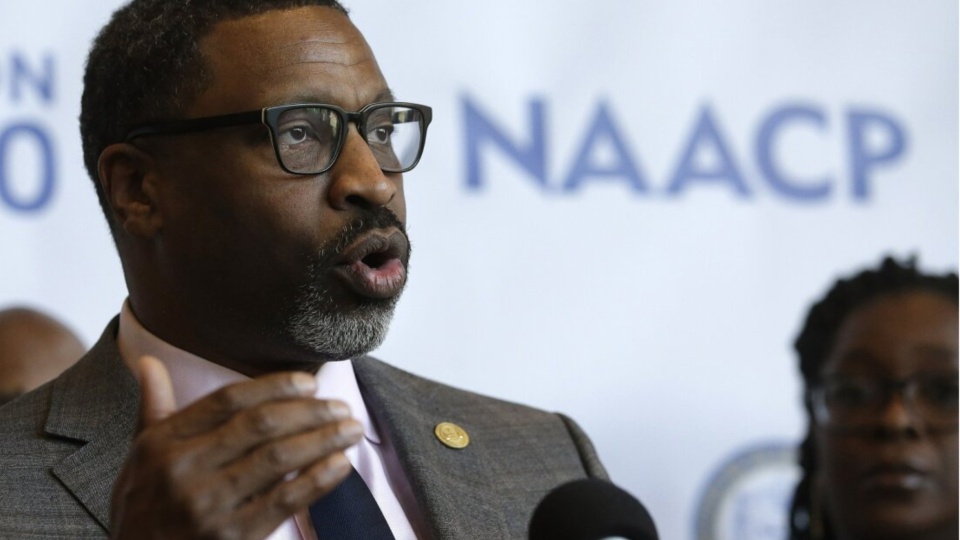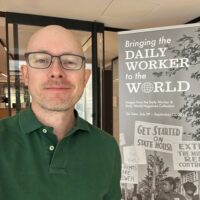
Every year of his first term in the White House, President Donald Trump declined the invitation to speak at the NAACP’s annual convention. He won’t have to bother this time around because he’s officially uninvited—the first president to receive that dishonor in the civil rights organization’s 116-year history.
The snub was announced by NAACP President Derrick Johnson at a press conference on Monday. “Our mission is to advance civil rights, and the current president has made clear that his mission is to eliminate civil rights,” Johnson said.
“It’s clear that Donald Trump is attacking our democracy and our civil rights,” declared the NAACP’s full statement on the matter. “He believes more in the fascist playbook than in the U.S. Constitution.”
The NAACP cited Trump executive orders suppressing voting rights and reversing federal civil rights protections as key factors in its decision, along with the president’s use of the military against civilians in U.S. cities and his efforts to undermine democracy to personally enrich himself and his political allies.
Unsurprisingly, the Trump White House has responded by accusing the NAACP of “promoting hate and division.”
The NAACP—whose full title is the National Association for the Advancement of Colored Peoples—is the oldest and largest civil rights organization in the country. It has been at the forefront of some of the most consequential struggles for racial equality, voting rights, and anti-discrimination legislation in U.S. history and has led campaigns against lynchings, racist violence, and white supremacy.
Trump’s actions, combined with the NAACP’s commitments, meant that placing the president on the do-not-admit list was an easy call. The wide range of assaults his administration is currently waging against not only Black Americans but against democracy in general made the decision a no-brainer, according to the group’s statement.
Along with other voting rights and civil rights groups, the NAACP is fighting to block Republicans’ misnamed SAVE Act, which could strip voting rights from millions. The proposed law would require people to provide passports or birth certificates to register to vote, mandate in-person voting while eliminating mail ballots, and potentially disenfranchise married women whose last names don’t match their original identity documents.
Such discriminatory practices particularly impact communities of color, but they also reach across racial lines to target wide swathes of the population.
Together with the National Education Association and AFSCME, the NAACP is also leading an effort in the courts to reverse Trump’s illegal attempt to dismantle the Department of Education and his freeze on funds for schools that keep their diversity, equity, and inclusion (DEI) programs.
It is also a part of nationwide boycott and consumer education campaigns to pressure corporations that are retreating on DEI. It issued a “Black Consumer Advisory” earlier this year to “inform and caution Black consumers about the ongoing and intentional rollback of nationwide DEI commitments by corporations and institutions.” These actions, the NAACP said in its Advisory, “threaten economic opportunities, workplace diversity, and community investments, directly impacting Black communities nationwide.”
Across the country, NAACP chapters are also deeply engaged in coalitions to block the Republican budget bill, called the “Big Beautiful Bill” by Trump, which has passed the House and is now being considered by the Senate.
Gloria Sweet-Love, president of the NAACP’s Tennessee affiliate, said last week that the bill is aimed at “crippling Medicaid and SNAP [food stamps].” Trump and the GOP want to redirect money from those programs to pay for tax cuts for the super-wealthy.

Sweet-Love said that if the bill passes, it will result in shuttered hospitals and hungry children. Medical facilities with higher numbers of patients who rely on Medicaid could see their doors close, she warned, while “cuts to food assistance for poor and working families would increase food insecurity…leaving schools, food banks, and local government to fill the gap.”
Add it all up, and Johnson says it should be clear that the decision to exclude Trump was not partisan. “This has nothing to do with political party,” he said, noting that every sitting president has been invited to the NAACP’s annual convention since the organization was founded in 1909.
Both Republicans and Democrats have addressed the gathering, including Harry Truman, Dwight D. Eisenhower, Ronald Reagan, George H.W. Bush, Bill Clinton, George W. Bush, Barack Obama, and Joe Biden.
Johnson said the annual convention, which is being held in Charlotte, N.C., next month, is “meant to be a safe space for all people—regardless of political ideology—who believe in multiracial democracy and the ideal of building a more perfect union.”
Trump does not believe in either, according to the NAACP.
“This administration does not respect the Constitution or the rule of law,” the organization said. “It would be a waste of our time and energy to give a platform to fascism.”
We hope you appreciated this article. At People’s World, we believe news and information should be free and accessible to all, but we need your help. Our journalism is free of corporate influence and paywalls because we are totally reader-supported. Only you, our readers and supporters, make this possible. If you enjoy reading People’s World and the stories we bring you, please support our work by donating or becoming a monthly sustainer today. Thank you!










